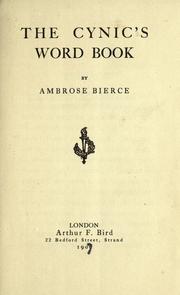The Devil's Dictionary

The Cynic's Word Book
|
|
| Author | Ambrose Bierce |
|---|---|
| Country | Great Britain (first British edition) |
| Language | English |
| Genre | Reference, satire, humor |
| Publisher | Arthur F. Bird |
|
Publication date
|
1906 |
|
Published in English
|
1906 |
| Followed by | The Devil's Dictionary |
The Devil's Dictionary is a satirical dictionary written by American Civil War soldier, journalist, and short story writer Ambrose Bierce. Consisting of common words followed by "howlingly funny" definitions, the lexicon was written over three decades as a series of installments for magazines and newspapers. Bierce’s witty definitions were imitated and plagiarized for years before he gathered them into books, first as The Cynic's Word Book in 1906 and then in a more complete version as The Devil's Dictionary in 1911.
Initial reception of the book versions was mixed. In the decades following, however, the stature of The Devil's Dictionary increased. It has been widely quoted, frequently translated, and often imitated, earning a global reputation. In the 1970s, The Devil's Dictionary was named as one of "The 100 Greatest Masterpieces of American Literature" by the American Revolution Bicentennial Administration.Wall Street Journal columnist Jason Zweig said The Devil's Dictionary is "… probably the most brilliant work of satire written in America. And maybe one of the greatest in all of world literature."
Ambrose Bierce was not the first writer to use amusing definitions as a format for satire. Four writers are known to have written witty definitions of words before him.
Bierce's earliest known predecessor was the Persian poet and satirist Nizam al-Din Ubaydullah Zakani (Ubayd Zakani), who wrote his satirical Ta'rifat (Definitions) in the thirteenth century.
Prior to Bierce, the most well-known writer of amusing definitions was Samuel Johnson. His A Dictionary of the English Language was published 15 April 1755. Johnson's Dictionary defined 42,733 words, almost all seriously. A small handful have witty definitions and became widely quoted, but they were infrequent exceptions to Johnson’s learned and serious explanations of word meanings.
Noah Webster earned fame for his 1806 A Compendious Dictionary of the English Language and his 1828 An American Dictionary of the English Language. Most people assume that Webster's text is unrelieved by humor, but (as Bierce himself was to discover and describe), Webster made witty comments in a tiny number of definitions.
Gustave Flaubert wrote notes for the Dictionary of Received Ideas (sometimes called Dictionary of Accepted Ideas; in French, Le Dictionnaire des idées reçues) between 1850 and 1855 but never completed it. Decades after his death, researchers combed through Flaubert’s papers and published the Dictionary under his name in 1913 (two years after Bierce’s book The Devil's Dictionary), “But the alphabetful of definitions we have here is compiled from a mass of notes, duplicates and variants that were never even sorted, much less proportioned and polished by the author.”
...
Wikipedia
